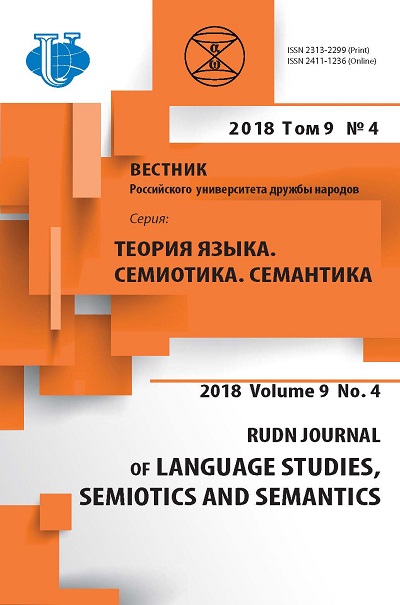COMPUTER AND NETWORK WORD IN THE RUSSIAN-LANGUAGE AND CHINESE-LANGUAGE COMMUNICATIVE INTERNET SPACE
- Authors: Denisenko V.N1, Ke Z.1
-
Affiliations:
- RUDN University
- Issue: Vol 9, No 4 (2018)
- Pages: 911-925
- Section: LANGUAGE THEORY
- URL: https://journals.rudn.ru/semiotics-semantics/article/view/20147
- DOI: https://doi.org/10.22363/2313-2299-2018-9-4-911-925
- ID: 20147
Cite item
Full Text
Abstract
This article is devoted to the topic of analysis of borrowed vocabulary in Russian and Chinese languages that is relevant in modern linguistics and language processes based on the lexicon of Internet communication in the field of computer and network technologies. The article provides a comparative analysis of the ways of borrowing foreign language lexical units in the field of information and communication technologies in the Russian and Chinese languages. The authors identify such types of borrowings as phonetic and semantic (word-formation and combination of tracing paper; etymological tracing, semantic tracing paper) in Russian and phonetic and semantic borrowing in Chinese, as well as graphical borrowed computer and network terms used in Russian and Chinese-language forums, and borrowing of English abbreviation terms in Russian and Chinese. Separately considered professional and slang vocabulary in the field of information and communication technologies, used in the Russian-speaking and Chinese-speaking forums. The main attention is paid to the peculiarities of their formation and functioning in the Russianspeaking and Chinese-speaking communicative space of the Internet.
About the authors
Vladimir N Denisenko
RUDN University
Author for correspondence.
Email: denissenko@mail.ru
Head of Department of General and Russian Linguistics of RUDN University; Interests: Interests semantics, phonetics, morphology and lexicology of the modern Russian language, as well as problems of General and Russian linguistics
Russia, Moscow, Miklukho-Maklaya str., 6, Moscow, Russia, 117198Zhang Ke
RUDN University
Email: ke6831@yandex.ru
postgraduate student of the Department of General and Russian Linguistics of RUDN University; Interests: Interests semantics
Russia, Moscow, Miklukho-Maklaya str., 6, Moscow, Russia, 117198References
- Krysin, L.P. (2004). Secondary borrowing and its description in the explanatory dictionary. Problems of Russian lexicography: Abstracts of the International conference. Moscow, 54—56. (in Russ).
- Marinova, E.V. (2013). Foreign Vocabulary of the modern Russian language. Moscow: Flinta. (in Russ.).
- Gao, Mingkai & Liu, Zhengyan (1958). The study of loan words in modern Chinese. Beijing. (in Chinese).
- Ge, Benyi (2002). Lexicology of the modern Chinese language. Jinan. (in Chinese).
- Lo, Changpei (1989). Language and culture. Beijing. (in Chinese).
- Liu, Yongquan (2002). Personal letters problems in Chinese. Language application, 1, 85—90. (in Chinese).
- Shi, Youwei (2004). Borrowed words — the messenger of foreign culture. Shanghai. (in Chinese).
- Perfilyeva, N.V. & Hu, Pai Рai (2012). Word-building Patterns in Neologisms-Loanwords in Russian and Chinese. Bulletin of Peoples’ Friendship University of Russia. Series: Theory of language. Semiotics. Semantics, 4, 69—74. (in Russ.).
- Berkov, V.P. (2003). From observations on changes in modern European languages. Modern language processes. Saint-Petersburg: izdatel'stvo SPb university, 3—22. (in Russ.).
- Kozhina, M.H. (1993). Stylistics of the Russian language. Moscow: Prosvesheniye. (in Russ.).
- Linguistic Encyclopedic Dictionary (1990). V.N. Yartseva (Ed.). Moscow: Sovetskaya entsiklopediya. (in Russ.).
- Erofeeva, T.I. (1991). Experience in the study of the speech of citizens (territorial social and psychological aspects). Sverdlovsk: izdatel'stvo The Ural university. (in Russ.).
- General Linguistics (1970). Forms of existence, functions, history of the language. B.A. Serebrennikov (Ed.). Moscow: Nauka. (in Russ.).
- Kutuzov, A.B. (2006). Model of the functioning of terminological slangism in the discourse of network forums: [dissertation]. Tyumen. (in Russ.).
Supplementary files












